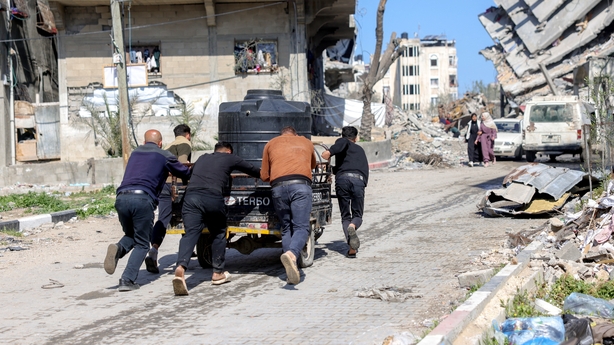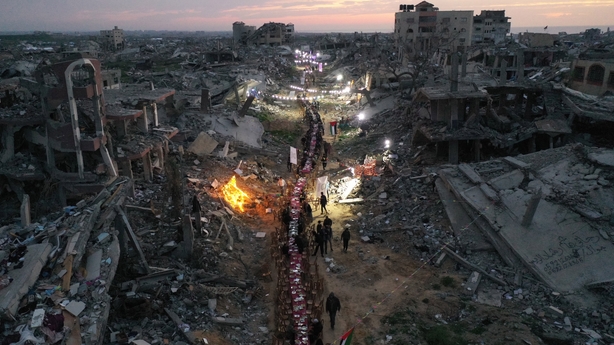Egypt has condemned Israel's decision to cut off electricity to Gaza, calling it a "new violation of international humanitarian law".
In a statement, the Egyptian foreign ministry said the move was part of Israel's "policies of collective punishment" after Israeli authorities blocked the entry of aid into Gaza last week.
Israel on Sunday disconnected the only power line to a water desalination plant in the war-ravaged Palestinian territory, as part of its efforts to pressure Hamas into agreeing to its terms in expected truce talks.
Egypt called on the international community to "take the necessary measures to stop these violations", echoing earlier statements from fellow mediator Qatar, as well as Saudi Arabia and Jordan.

The United Nations has warned of "dire consequences" for Gaza's population and said that as the occupying power, Israel had a legal obligation to ensure the provision of the necessities of life for Palestinians living under its control.
Gaza's civil emergency service has said that four Palestinians were killed today in an Israeli air strike.
It comes as Arab mediators, and the United States, tried to hammer out differences between Hamas and Israel over a 19 January ceasefire agreement.
The Israeli military said its air force attacked "terrorists who were engaged in a suspicious activity on the ground in central Gaza and posed a threat to the force".
At the Al-Ahli Arab Baptist Hospital, relatives of the dead men arrived to bid farewell, sitting around the white-shrouded bodies. Medics and relatives said the four dead, who included two brothers, were civilians.
"Did we end the war or what happened? We don't know," said Arafat Al-Hana, the father of one of the victims.
Israel sent a delegation to the Qatari capital, Doha, for more ceasefire talks, and Hamas leaders ended a round of talks in Cairo earlier this week. But there has been no sign of a breakthrough to resolve the disputes that threaten a return to armed conflict.

Fighting in Gaza has been halted since 19 January under a first phase of the truce, and Hamas has exchanged 33 Israeli hostages and five Thais for some 2,000 Palestinian prisoners and detainees.
Hamas wants to begin talks on a second phase that was supposed to reach an agreement over Israel's full pullout from the enclave. Israel demands that the Palestinian militant group free the remaining hostages without beginning phase two negotiations.
Hamas has accused Israel of trying to cause famine in Gaza by continuing to suspend the entry of aid and also by its decision to sever its last working line of electricity to the enclave, a move that impacted a water desalination and sewage treatment facility.
Pressure
"We call on mediators to pressure the occupation (Israel) to abide by its pledges and open the crossings immediately, to ensure the flow of humanitarian aid and end the policy of collective punishment pursued by the occupation authorities against our people," it said in a statement.
Israel cut aid flows of food, medicine, and fuel imports this month, aiming to pressure Hamas in ceasefire talks. On Sunday it announced an electricity cut, which aid groups say would deprive Gazans of clean water.
There is a risk that Gaza will experience another hunger crisis if Israel continues to block aid, the head of the UN Palestinian relief agency (UNRWA) in Gaza said yesterday.
Read more:
"I think the more we go ahead (with aid blockages), the more we will see the impact increasing on the population. And obviously, the risk ... is that we go back to situation we experienced months ago about deepening hunger in the Gaza Strip," said UNRWA Commissioner-General Philippe Lazzarini.
Hamas-led militants carried out a cross-border raid into southern Israel on 7 October 2023, triggering an Israeli offensive into Gaza that has killed more than 48,000 Palestinians, according to Gaza health officials.
Hamas militants killed 1,200 people and took 251 hostages, according to Israeli tallies.

